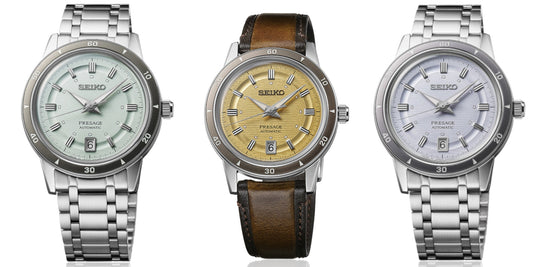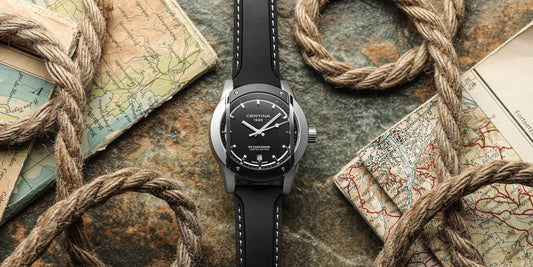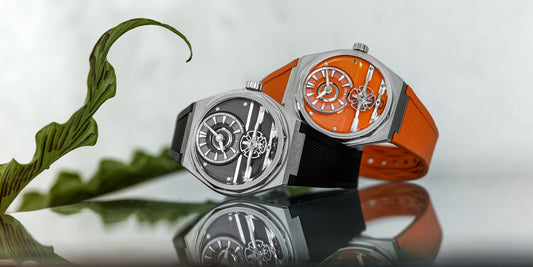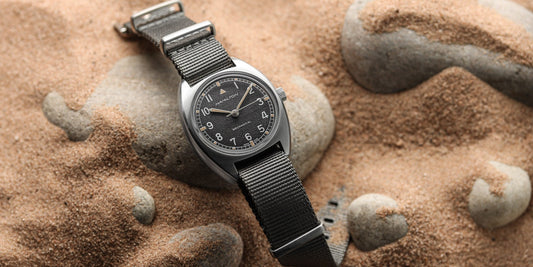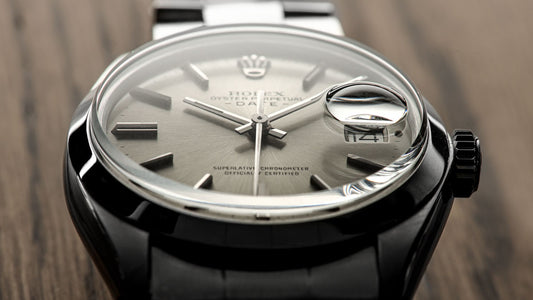10 for 10 Ep.4: There is an almost endless amount of vintage watches available, so why is this the one you need to know about?
Welcome back to another instalment of 10 for 10. This is a series from WatchGecko that sets out to inform you, the reader of 10 watches branching over 10 different categories that combined offer an extremely versatile, enjoyable and rounded collection. All together coming in at a value less than £10,000. Some watches maybe more expensive, some may be extremely affordable but together they will collectively cost less than £10,000.
Stay tuned to the blog for regular new episodes as well as our YouTube channel for extended looks at each watch featured. If you are interested in purchasing a divers watch to add to your collection you can view our own range of divers watches here.
Why you need vintage watches in your collection.
Up until now, we have focused purely on new watches that are readily available online. However for episode 4, I think it's time we have a look at something completely different...

The Rolex 1016 Explorer - Image credit BobsWatches bobswatches.com
Vintage watches have been increasing in popularity year on year, one only needs to look at examples from Rolex such as the 1016, 5513, 1675 and of course the Paul Newman to know all of these models have increased in value as a minimum of 100%...

The Rolex 'Paul Newman' Daytona 6239 - Image credit BobsWatches bobswatches.com
Unfortunately all of the above references are now more than £10,000 so can’t make an appearance in this series, however, there is a watch which equally has similar charm and history...
It seems now is the time to get involved with vintage watches before you’re left in the past (pun intended - sorry...)
Caravelle Watches - a brief history

To find out more about Caravelle watches we actually need to look at Bulova's history. Caravelle was introduced in 1962 as a way for Bulova to create and offer consumers a wider range of watches at a lower price point. Commonly priced around $10 - $30, Caravelle was Bulova's more affordable lineup, and enabled them the opportunity to produce models for the market without potentially harming or de-valuing the Bulova name (Think of Bulova as Rolex and Caravelle as Tudor if you will.)
However, build quality of the watches still remains at a respectable level with many examples available on the vintage watch market. 1968 was a big year for the parent company Bulova as the Satellite Clock (the first public clock to display time controlled by time signals broadcast by orbiting satellites) was installed on Mexico's tallest skyscraper. Caravelle also had a good year as it has cracked the US and became the largest selling jewelled movement watch.
The Caravelle Seahunter 'Devil Diver'
As expected with older watches, the Caravelle comes in smaller than our modern interpretation of diving watches with a case width of 36.5mm, a lug to lug distance of 44mm and a thickness around 11mm. As vintage watches go, these dimensions are actually very wearable on modern wrists, closely resembling the Datejust and Explorer. Much like the cases on Rolex watches, the Caravelle hugs the wrist remarkably well with the case back disappearing into the wrist and hiding a good chunk of its 11mm thickness.
A profile view of the case also reveals it's gradual curve towards the end of the lugs - another great little feature of the Caravelle that really assists the watches wear-ability. Originally the watch came with a diving rotating bezel, however, this specific model was a fully faded out one - I’ll explain why it isn’t fitted with that later.
The watch features an acrylic crystal, universally accepted as the standard for watches of this age. Looking through the acrylic you'll notice the watches uncluttered, simple, balanced dial layout. Just a simple 3,6,9 and 12 along with short indices and the minimal obligatory branding/water resistance rating text grace the dial.

Some may say this dial configuration is 'boring', but in reality its far from it. The flat matt black dial texture reminds the wearer of the watches practical tool watch past life. Simple clean stick hands keep track of the time with varying amount of ageing per watch. The hands are subtly curved down the middle inviting light to bounce off the hands at different angles.
The watch is (well, was) water resistant to 666 feet which is approximately 200m. This is a very practical and useable depth for a diving watch, however, I would advise your Caravelle admires the water from a distance nowadays as time will not have been kind on the internal rubber and seals, not guaranteeing the watches water resistance at all.
With a rating of 666 ft on the dial, you can see where the nickname 'Devil Diver' comes from.
How does to wear on the wrist?

With all of those impressive stats, it should come as no surprise that the Caravelle wears brilliantly on the wrist. The watches pure, 'no frills' design means it has versatility in abundance. Throw it on a metal strap and you retain the watches purposeful past. Or swap it out for a quality leather strap and allow your Caravelle to retire in daily comfort and class. For a vintage watch, the build quality is reassuringly high meaning you have a piece in the collection you don't feel scared about knocking.
For a watch which was a part of the 'budget' or 'value' line up it really does punch above its weight. The watch isn't a bulky piece and can adapt quickly to different situations you may be wearing it in.
One key, almost unexplainable feature of vintage watches is their charm. Vintage watches just have something about them. It could be their uniqueness. The fact you can have two exact models next to each other and they can easily be vastly different is pretty special. Whatever it is, the Caravelle has it.
The watch flies under the radar once on the wrist avoiding any unwanted attention. All of this sounds very similar to a popular watch from Mr Wilsdorf...
Why the Caravelle?
Side by side the Explorer and the Devil Diver look like long lost brothers - The Rolex 114270
In short, the main reason this watch works so well (and what attracted me to it) is down to it's uncanny resemblance to the 1016. This particular reference from Rolex was produced from the 50s to the 80s making it one of the longest references numbers with the Rolex crown to come out of Switzerland. The Explorer can handle both black tie events and the top of Everest with ease. In fact, a 1016 did just that in 1953...
Naturally being vintage, the cost of these pieces can vary depending on the condition. The example we see here cost around £200 without a strap and with a fully faded bezel. I decided to take the bezel off the watch to really emphasise the watches similarity to the 1016 Explorer - it had to be done.
With such a similar design to the iconic Explorer, everything all starts to make sense as to why the Caravelle is a stand out option as a vintage watch.
Butterfly Solid 5 Link D Profile by Geckota
This is a look I immediately wanted to put together when getting my hands on the Caravelle. This bracelet combination further advances on the watches bare bones, purposeful design and once again is very reminiscence of the 1016 from Rolex.
This strap uses the standard curved ends available on the site fitting the Caravelle's case curve.
Painswick QR Distressed Brown by Geckota
One of our most popular newer additions to our range, the Painswick QR is a great strap for the Caravelle. Firstly the strap has a distressed texture to which really works to emphasise the watches tool watch origins. Next, the strap is around 2.2mm thick, meaning for thinner watches this is the perfect option. And finally, quick release spring bars mean you can easily switch up the straps without tools.
For the Caravelle, I went for the Distressed Brown adding a nice level of warmth to the piece.
Cebu Pastel Soft Top Grain Black by Geckota
If you're actively following along with the series, you will have seen in the past we tend to suggest brown watch straps however black watch straps are equally as great for changing the look of a watch. Here, the Cebu Pastel Soft Top Grain gives the Caravelle an extremely classic look. It uses of top grain leather means its incredibly soft to touch and perfectly comfortable instantly.
Variations in the model
As you may imagine, Bulova and Caravelle didn't just create this one model under the Seahunter name. There are many examples which range from chunkier cases, the use of bright coloured seconds hands, integrated bracelets and white dials.
One of these other examples is the following watch...
This is a slightly smaller example with a case width around 34.5mm, a lug to lug of 41mm and a thickness still around the 11mm mark. The 6,9 and 12 remain on the dial however a date window replaces the 3, we see slimmer hour markers, longer seconds track and a lovely black bezel which over the years has turned a royal blue in certain light. The final most prominent difference of this watch is those hands.

Commonly seen on watches such as the Longines Heritage Skin Diver, these heat-blued hands combine an almost broad arrow hand with a gradually pointed minutes hand. All of these core features sits on top of a deep gloss black dial. The example is also powered by a Swiss automatic movement rather than the manual wind Japanese choice for the main attraction.
Two Caravelle Watches with two very different engines... (left Caravelle Seahunter with Japanese manual wind movement, right Swiss made automatic Caravelle)
As you can see, this results in a vastly different watch when you bring the two Devil Diver's together. Strap wise, this version of the Caravelle has and probably will spend most of its life on our Butterfly Solid 5 Link D Profile which helps the watch wear just a tad bigger than the 34.5mm diameter.

And just to prove how much I truly enjoy these watches - they both proudly sit in my personal watch box.
Experience the watch for yourself!
Find out more about the Caravelle Seahunter and see the watch hands on in our latest video below...
Vintage watches have a place in your collection

So, why should you add vintage watches to your collection? Well, to start with I've given a more detailed look as to why you should be buying vintage previously on the blog here, but let me summarise.
Firstly the history these watches hold cannot be truly replicated. That unexplainable charm we mentioned earlier is truly unique to vintage watches and best told through wear, patina and visual ageing. The feeling that these watches have lived a life before your ownership is quite intoxicating when you explore the world of vintage.
And of course, the Caravelle Devil Diver, in particular, offers charm, wearability, universal style and timeless design all in a watch that can be had for between £200-£1000.
With the watches visible rise in popularity over the past 12 months, I’d advise picking one up as soon as you can...













